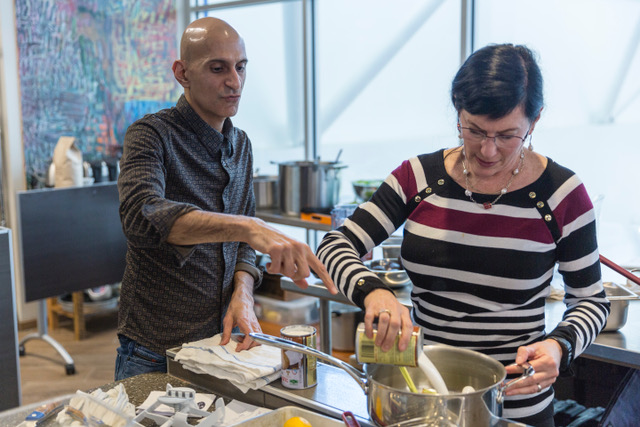- Home
- Symposia
INTERNATIONAL SOCIETY OF NEUROGASTRONOMY SYMPOSIUM
Wednesday, April 20, 2022
8:00 AM - 5:00 PM
IN-PERSON OR ONLINE
Cost: Included with AChemS Registration Fee or 100 USD

The International Society of Neurogastronomy (ISN) is a professional organization for culinary professionals, agriculture professionals, health care professionals, and scientists of gastronomy in the context of brain and behavior. The concept of Neurogastronomy casts a wide net over all disciplines that are relevant to what we eat, why we like what we eat, and how we eat. The mission of ISN is to advance Neurogastronomy as a craft, science, and health profession, to enhance quality of human life, and to generate and disseminate knowledge of brain-behavior relationships in the context of gastronomy.
Flavor is a major unifying theme for ISN - what it is and how to use it to promote health. Flavor is a natural intersection where taste and smell science overlaps with clinical problems related to food and nutrition, with agriculture, and with chefs and the food preparation industry. ISN reaches out to the public to promote a broad understanding of how taste and smell affect food choices and consumption. ISN also works to develop and promote evidence-based strategies for all areas of health related to flavor. Examples include the impaired flavor perception of chemotherapy patients and appetite control and healthy eating in the face of an epidemic of overconsumption. The founders of ISN invite you to come and join in!

Platform presentations. Speakers will deliver lectures spanning the breadth of ISN. This includes the development of foods that are more flavorful and have greater nutrition benefits, new agricultural practices, the science behind flavor and appetite, and the clinical benefits of a healthy diet.
Dinner Workshop. ISN also offers a Neurogastronomy Dinner Workshop. The tradition of this event is to feature the culinary skills of local chefs in a setting where participants can experience flavor while learning about its nature and origins. More information and opportunities to register for this event will be provided separately at a later date.
ISN 2022 Travel grants for Trainees and Persons from Underrepresented Groups. Trainees (students and postgraduate fellows) and persons of recognized minority groups, disabled persons, and veterans are eligible for these awards. Interested persons should view the rules and procedures document.
Conference Objectives.The International Society of Neurogastronomy (ISN) is a professional society composed of neuroscientists, clinicians, agricultural scientists, and chefs devoted to understanding smell, taste, and flavor mechanisms, as well as applying this understanding to food and nutrition. ISN's annual symposium creates an interdisciplinary curriculum that is relevant to all professions dedicated to improving human health, but especially physicians, psychologists, neuroscientists, therapists, nutritionists, and dieticians. The curriculum is structured to allow these practitioners to keep pace with emerging issues and technologies, gaining and maintaining competencies in knowledge of concepts and applications related to neurogastronomy in order to enhance their contributions to their professions. ISN's curriculum is uniquely interdisciplinary and casts a wide net over all disciplines that are relevant to what we choose to eat, why we like what we eat, and how we eat. The mission of ISN is to advance neurogastronomy as a craft, science, and health profession, to enhance quality of human life, and to generate and disseminate knowledge of brain-behavior relationships in the context of gastronomy. The ISN 2022 symposium will have a hybrid format with both in-person and live streaming options for attendees.
ISN Symposium 2022 Speakers

Frederic Morin, chef. A Chef’s Perspective
Chef Morin is a founder of the internationally renowned restaurant, Joe Beef, in Montreal. He has been featured in The Layover on the Travel Channel and in Anthony Bordain’s Parts Unknown on CNN.
Dr. Dunn is an evolutionary biologist investigating human biodiversity. He is the author of seven books, most recently collaborating with Dr. Monica Sanchez to write Delicious: The Evolution of Flavor and How It Made Us Human. Carlos Rodriguez Lopez, Ph.D., University of Kentucky. Bugs, epialleles and ancient vines: a multifocal view on wine quality
Dr. Lopez is an expert on local environmental factors causing crops to have distinct flavors depending on their regions of origin. This concept of “terroir” is the basis of France’s wine appellation d’orgine contrôlée system. Merri Metcalf, M.S., The Bread Lab, Washington State University. The Flavor, Nutrition & Sound of Wheat
Ms. Metcalf is a registered dietician who has worked on sports nutrition and the treatment of eating disorders. She is currently a Ph.D. student contributing to The Bread Lab’s remarkable success in developing healthier and more flavorful grains suitable for whole grain products. Harry J. Klee, Ph.D., University of Florida. Progress in the War Against the Tasteless Tomato
Dr. Klee is an expert on the genetic and chemical determinants of flavor in fruits and vegetables. His research group has made great advances in developing high yield tomato varieties with heirloom-level flavor. Amber Alhadeff, Ph.D., University of Pennsylvania and Monell Chemical Senses Center. The Power of Hunger
Dr. Alhadeff is a neuroscientist doing groundbreaking work on the physiology of hunger and the behaviors motivated by hunger. This includes gut-brain signaling and the role of the brain’s reward circuits. Dietmar Krautwurst, Ph.D., Liebnitz Institute for Food Systems Biology and Technical University of Munich. Key food odorants and their receptors – perfect matches for our complex sense of olfaction.
Dr. Krautwurst helped discover that less than 300 volatile compounds matter when it comes to flavor. Growing knowledge of these flavor molecules and their receptors sets the stage for enhanced control of flavor perception. Nisha Pradhan, University of Colorado. Mom, am I full yet?
Ms. Pradhan is an advocate for people living with anosmia, the absence of a sense of smell. She is currently a medical student and is the founder of Anosmic Chef, a crowdfunded collection of recipes and recommendations by and for anosmics.
CE INFORMATION

In support of improving patient care, University of Kentucky HealthCare CECentral is jointly accredited by the Accreditation Council for Continuing Medical Education (ACCME), the Accreditation Council for Pharmacy Education (ACPE), and the American Nurses Credentialing Center (ANCC), to provide continuing education for the healthcare team.
CME

IPE Competencies
- Values/Ethics for Interprofessional Practice
- Roles/ Responsibilities
- Interprofessional Communication
UK Healthcare CECentral certifies this activity for 5.5 hours of participation.
CDR

Learning Need Code (write in below before submitting):


 Supported by the National Institute on Deafness and Other Communication Disorders
Supported by the National Institute on Deafness and Other Communication Disorders


